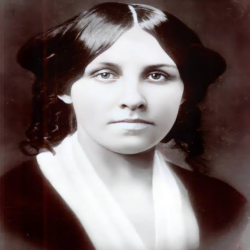
Louisa May Alcott
| Date of Birth | : | 29 Nov, 1832 |
| Date of Death | : | 06 Mar, 1888 |
| Place of Birth | : | Germantown, Philadelphia, Pennsylvania, United States |
| Profession | : | Short Story Writer, Novelist |
| Nationality | : | American |
Louisa May Alcott was an American novelist, short story writer, and poet best known for writing the novel Little Women and its sequels Little Men and Jo's Boys.
Early life
Louisa May Alcott was born on November 29, 1832, in Germantown, which is now part of Philadelphia, Pennsylvania, on her father's 33rd birthday. Her parents were transcendentalist and educator Amos Bronson Alcott and social worker Abigail "Abby" May. She was the second of four daughters: Anna Bronson Alcott was the eldest, while Elizabeth Sewall Alcott and Abigail May Alcott were the two youngest. As a child, she was a tomboy who preferred boys' games. The family moved to Boston in 1834, where Alcott's father established the experimental Temple School and joined the Transcendental Club with Ralph Waldo Emerson and Henry David Thoreau. Bronson Alcott's opinions on education, tough views on child-rearing, and moments of mental instability shaped young Alcott's mind with a desire to achieve perfection, a goal of the transcendentalists. His attitudes towards Alcott's wild and independent behavior and his inability to provide for his family created conflict between Bronson Alcott, his wife, and their daughters. Abigail reportedly resented her husband's inability to recognize her sacrifices and related his thoughtlessness to the larger issue of the inequality of sexes. She passed this recognition and desire to redress wrongs done to women on to Louisa.
Later years
In 1877, Alcott was one of the founders of the Women's Educational and Industrial Union in Boston. After her youngest sister May died in 1879, Louisa assumed the care of her niece, Lulu, who was named after Louisa. Alcott suffered chronic health problems in her later years, including vertigo. She and her earliest biographers attributed her illness and death to mercury poisoning. During her American Civil War service, Alcott contracted typhoid fever and was treated with Calomel, a compound containing mercury. Recent analysis of Alcott's illness suggests that her chronic health problems may have been associated with an autoimmune disease, not mercury exposure. However, mercury is a known trigger for autoimmune diseases as well. An 1870 portrait of Alcott does show her cheeks to be quite flushed, perhaps with the "butterfly rash" across cheeks and nose which is often characteristic of lupus, but there is no conclusive evidence available for a firm diagnosis.
Quotes
Be comforted, dear soul! There is always light behind the clouds.
I am not afraid of storms for I am learning how to sail my ship.
Keep good company, read good books, love good things and cultivate soul and body as faithfully as you can
The power of finding beauty in the humblest things makes home happy and life lovely.
Nothing is impossible to a determined woman.
It’s amazing how lovely common things become, if one only knows how to look at them.
We all have our own life to pursue, our own kind of dream to be weaving, and we all have the power to make wishes come true, as long as we keep believing.
Where the heart is the mind works best.
Far away there in the sunshine are my highest aspirations. I may not reach them, but I can look up and see their beauty, believe in them, and try to follow where they lead.
Life is my university, and I hope to graduate from it with some distinction.
